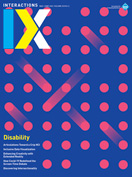Authors:
Soraia Prietch, Stacy Branham
ACM SIGCHI recognizes that work is needed to guarantee everyone's right to equality while attending conferences, publishing articles, volunteering, and participating in other initiatives through which people can exchange information, interact with peers, and collectively build an inclusive and empowering research community. This recognition is based on the principles of critical disability theory [1], under the lens of which cultural, historical, social, and political aspects can be analyzed to support decision making about inclusion and accessibility.
How did the adjunct chair for accessibility come about? The adjunct chair (AC) for accessibility [2] position is a recent structural change aimed at consolidating ongoing efforts within the ACM SIGCHI Executive Committee to reach the community, learn about access barriers, and promote actions to overcome them. In terms of support for accessibility at SIGCHI conferences [3], in 2020 a four-year retrospective in Interactions reported on available accessibility services and budgets, as well as the accessibility chair's role. SIGCHI provides accessibility guidelines for organizers of sponsored or co-sponsored conferences [4] and recommends using the Accessible Conference Guide from SIGACCESS [5].
With many conferences moving from in-person to virtual, new accessibility challenges have emerged. Thus, ACM published a guide to best practices to support the organization of virtual conferences [6], where video presentations [7] are the norm. Attendees and organizers can find useful information in the Accessibility FAQ for each conference, such as the CHI 2021 Accessibility FAQ[8]. As for publications, SIGCHI follows templates and workflows [9], including guidelines for accessible formats [10] and figure descriptions [11] in accordance with the ACM Publishing System (TAPS). Also, each conference may provide specific guidelines, such as the Guide to an Accessible Submission for CHI 2021 [12]. Other initiatives to support people with disabilities are being proposed, regarding operations [13], inclusion [14], CARES [15], and calls for volunteering positions [16]. The EC created the AC for accessibility position as a culmination of the efforts mentioned above along with the synergistic activities of community groups such as Access SIGCHI [17].
What are the goals of the current AC for accessibility? As the first adjunct co-chairs for accessibility, we felt it was important to state our long-term vision for this position: "We seek a future in which people with a diverse range of disabilities can participate in all aspects of the SIGCHI community—as SIGCHI leaders, volunteers and members, published scholars, conference participants, and students and practitioners of HCI." From this statement we derive four short-term goals: 1) track global accessibility barriers and opportunities within SIGCHI, 2) connect community members to accessibility resources, 3) increase responsiveness and transparency of accessibility-oriented activities, and 4) advocate for encoding accessibility in SIGCHI and the ACM.
We look forward to reading your emails at [email protected], whether you wish to share specific accessibility needs or offer any recommendations, resources, or questions.
To access the references cited in this piece, please visit: https://docs.google.com/document/d/1ZL5uOP04Lkwcim1X1gF9W2W8vsuPu4oI5xhZBBWxnA/edit?usp=sharing
Text translations in Brazilian Portuguese and Latin American Spanish: https://drive.google.com/file/d/17olkVzxPa-V_CWyKLgO_mIeSvPXBFSFy/view
Soraia Prietch is a professor at the Federal University of Rondonópolis in Brazil. She has been working with research projects involving people with disabilities for 12 years. [email protected]
Stacy Branham is an assistant professor at the University of California, Irvine, where she studies the design of technologies with and for people with disabilities. [email protected]
Copyright held by authors
The Digital Library is published by the Association for Computing Machinery. Copyright © 2021 ACM, Inc.









Post Comment
No Comments Found